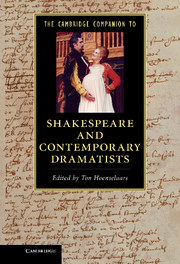Book contents
- Frontmatter
- Contents
- Illustrations
- Contributors
- Preface
- Chronology of the life and work of Shakespeare and contemporary dramatists
- 1 John Lyly and the University Wits
- 2 Thomas Kyd and the Elizabethan blockbuster
- 3 ‘The words of Mercury’
- 4 The dyer’s hand
- 5 Urbane John Marston
- 6 Thomas Dekker and the emergence of city comedy
- 7 Shakespeare
- 8 Thomas Heywood
- 9 George Chapman’s learned drama
- 10 Francis Beaumont and John Fletcher’s tragicomedy as musical melodrama
- 11 Thomas Middleton and the early modern theatre
- 12 John Webster
- 13 John Ford
- 14 Philip Massinger
- 15 Richard Brome and the idea of a Caroline theatre
- 16 Troublesome histories
- Select bibliography
- Index
- References
1 - John Lyly and the University Wits
George Peele, Robert Greene, Thomas Lodge and Thomas Nashe
Published online by Cambridge University Press: 05 December 2012
- Frontmatter
- Contents
- Illustrations
- Contributors
- Preface
- Chronology of the life and work of Shakespeare and contemporary dramatists
- 1 John Lyly and the University Wits
- 2 Thomas Kyd and the Elizabethan blockbuster
- 3 ‘The words of Mercury’
- 4 The dyer’s hand
- 5 Urbane John Marston
- 6 Thomas Dekker and the emergence of city comedy
- 7 Shakespeare
- 8 Thomas Heywood
- 9 George Chapman’s learned drama
- 10 Francis Beaumont and John Fletcher’s tragicomedy as musical melodrama
- 11 Thomas Middleton and the early modern theatre
- 12 John Webster
- 13 John Ford
- 14 Philip Massinger
- 15 Richard Brome and the idea of a Caroline theatre
- 16 Troublesome histories
- Select bibliography
- Index
- References
Summary
Figures of rhetoric – figures of speech
Today John Lyly is the most neglected, underappreciated and misunderstood Elizabethan playwright. Lyly’s understanding of the world, and of language, came out of his own personal heritage which he honoured throughout his uneven career. He was the grandson of William Lyly (also spelled as Lily and Lilye), High Master of St Paul’s School and, with John Colet, author of the grammar school Latin text that was required at all Elizabethan schools and that survived as the fundamental Latin text well into the nineteenth century; the two men added ‘Godly Lessons for Chyldren’ which began with the central theme of all of John Lyly’s writings: ‘It is the fyrst poynte of wysedome, to know thy self.’ William Lyly was a member of the leading circle of humanists, including Erasmus and Thomas More, and his son – John’s father – was in turn a tutor in Canterbury or at the Queen’s School connected to the cathedral. John Lyly (c. 1554–1606) followed his grandfather to Magdalen College, Oxford, where he stayed an extra two years hoping for a teaching post there or for preferment under William Cecil, Lord Burghley. Instead, Burghley got him a position as secretary to his son-in-law, Edward de Vere, Earl of Oxford.
Humanism taught Lyly to love the classics. His first play, Campaspe (1583) came from Pliny and Plutarch’s Life of Alexander; it was phenomenally successful, going through three editions in a single year. His second play, Sappho and Phao, appeared two months later; it drew on Aelian and Ovid and immediately went through two editions. Lyly’s mode of writing, too – what his editor Carter A. Daniel calls ‘the ornately symmetrical prose style filled with fantastic similes and constructed in rhythmic swirls of alliteration and antithesis’ – is also classical.
- Type
- Chapter
- Information
- Publisher: Cambridge University PressPrint publication year: 2012
References
- 1
- Cited by



